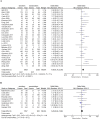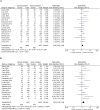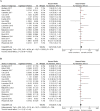The impact of smoking on recurrence and progression of non-muscle invasive bladder cancer: a systematic review and meta-analysis
- PMID: 36404390
- PMCID: PMC10129946
- DOI: 10.1007/s00432-022-04464-6
The impact of smoking on recurrence and progression of non-muscle invasive bladder cancer: a systematic review and meta-analysis
Abstract
Objectives: Although smoking is a well-recognized causative factor of urothelial bladder cancer and accounts for 50% of cases, less is known about the prognostic significance of smoking on non-muscle invasive bladder cancer (NMIBC) prognosis. This systematic review and meta-analysis aimed to evaluate the effect of smoking on the risk of NMIBC recurrence and progression.
Materials and methods: We systematically searched Medline, Web of Science and Scopus databases for original articles published before October 2021 regarding the effect of smoking on NMIBC recurrence and progression. Information about smoking status and the number of events or odds ratio or hazard ratio for event-free survival must have been reported to include the study in the analysis. Quality In Prognosis Studies tool was utilized for the risk of bias assessment.
Results: We selected 64 eligible studies, including 28 617 patients with NMIBC with available data on smoking status. In a meta-analysis of 28 studies with 7885 patients, we found that smokers (current/former) were at higher risk for recurrence (OR = 1.68; 95% CI 1.34-2.09; P < 0.0001) compared to never smokers. Subgroup analysis of 2967 patients revealed that current smokers were at a 1.24 higher risk of recurrence (OR = 1.24; 95% CI 1.02-1.50; P = 0.03) compared to former smokers. A meta-analysis of the hazard ratio revealed that smokers are at higher risk of recurrence (HR = 1.31; 95%CI 1.15-1.48; P < 0.0001) and progression (HR = 1.18; 95%CI 1.08-1.29; P < 0.001) compared to never smokers. Detrimental prognostic effect of smoking on progression, but not for recurrence risk was also noted in the subgroup analysis of high-risk patients (HR = 1.30; 95%CI 1.09-1.55; P = 0.004) and BCG-treated ones (HR = 1.15; 95%CI 1.06-1.25; P < 0.001).
Conclusion: In conclusion, patients with non-muscle invasive bladder cancer and a history of smoking have a worse prognosis regarding recurrence-free and progression-free survival compared to non-smokers.
Keywords: Current smoker; Non-muscle-invasive bladder cancer; Progression; Recurrence; Smoking.
© 2022. The Author(s).
Conflict of interest statement
The authors declare no conflict of interest.
Figures









Similar articles
-
Intravesical electromotive drug administration for non-muscle invasive bladder cancer.Cochrane Database Syst Rev. 2017 Sep 12;9(9):CD011864. doi: 10.1002/14651858.CD011864.pub2. Cochrane Database Syst Rev. 2017. PMID: 28898400 Free PMC article.
-
Intravesical gemcitabine for non-muscle invasive bladder cancer.Cochrane Database Syst Rev. 2012 Jan 18;1:CD009294. doi: 10.1002/14651858.CD009294.pub2. Cochrane Database Syst Rev. 2012. Update in: Cochrane Database Syst Rev. 2021 Jun 14;6:CD009294. doi: 10.1002/14651858.CD009294.pub3. PMID: 22259002 Updated.
-
Intravesical Bacillus Calmette-Guérin with interferon-alpha versus intravesical Bacillus Calmette-Guérin for treating non-muscle-invasive bladder cancer.Cochrane Database Syst Rev. 2017 Mar 8;3(3):CD012112. doi: 10.1002/14651858.CD012112.pub2. Cochrane Database Syst Rev. 2017. PMID: 28268259 Free PMC article.
-
Intravesical gemcitabine therapy for non-muscle invasive bladder cancer (NMIBC): a systematic review.BJU Int. 2012 Feb;109(4):496-505. doi: 10.1111/j.1464-410X.2011.10880.x. BJU Int. 2012. PMID: 22313502
-
Treatment options for progression or recurrence of glioblastoma: a network meta-analysis.Cochrane Database Syst Rev. 2021 May 4;5(1):CD013579. doi: 10.1002/14651858.CD013579.pub2. Cochrane Database Syst Rev. 2021. PMID: 34559423 Free PMC article.
Cited by
-
Changes in the Urinary Microbiome After Transurethral Resection of Non-muscle-Invasive Bladder Cancer: Insights from a Prospective Observational Study.Ann Surg Oncol. 2024 Jul;31(7):4773-4786. doi: 10.1245/s10434-024-15198-9. Epub 2024 Apr 3. Ann Surg Oncol. 2024. PMID: 38570378
-
Perspectives on an Intensive Hospital-Based Smoking Cessation Intervention in Relation to Transurethral Resection of the Bladder Tumour (TURBT): Interviews with Patients, Relatives, and Clinicians.Int J Environ Res Public Health. 2025 Apr 3;22(4):555. doi: 10.3390/ijerph22040555. Int J Environ Res Public Health. 2025. PMID: 40283780 Free PMC article.
-
Effect of smoking on the recurrence and progression of non-muscle-invasive bladder cancer.Clin Transl Oncol. 2025 Apr;27(4):1695-1711. doi: 10.1007/s12094-024-03694-z. Epub 2024 Sep 12. Clin Transl Oncol. 2025. PMID: 39266874 Review.
-
Cancer-Specific Survival of Patients with Non-Muscle-Invasive Bladder Cancer: A Population-Based Analysis.Ann Surg Oncol. 2023 Nov;30(12):7892-7902. doi: 10.1245/s10434-023-14051-9. Epub 2023 Aug 14. Ann Surg Oncol. 2023. PMID: 37578604 Free PMC article.
-
Can We Go beyond Pathology? The Prognostic Role of Risk Scoring Tools for Cancer-Specific Survival of Patients with Bladder Cancer Undergoing Radical Cystectomy.Biomedicines. 2024 Jul 11;12(7):1541. doi: 10.3390/biomedicines12071541. Biomedicines. 2024. PMID: 39062114 Free PMC article.
References
-
- Abd Elwahab KM, Desky EAE, Eldery MS, Mohammad FF, Seleem MM, El-Babouly IM (2021) Apparent diffusion coefficient value can predict poor bacillus calmette-guérin responders in T1HG/NMIBC: prospective cohort study. Clin Genitourin Cancer 19(4):e248–e254 - PubMed
-
- Abufaraj M, Shariat SF, Haitel A, Moschini M, Foerster B, Chłosta P et al (2017) Prognostic role of N-cadherin expression in patients with non–muscle-invasive bladder cancer. Urol Oncol Semin Orig Investig 35(5):264–271 - PubMed
-
- Ahirwar D, Kesarwani P, Manchanda PK, Mandhani A, Mittal RD (2008) Anti- and proinflammatory cytokine gene polymorphism and genetic predisposition: association with smoking, tumor stage and grade, and bacillus Calmette-Guérin immunotherapy in bladder cancer. Cancer Genet Cytogenet 184(1):1–8 - PubMed
-
- Ajili F, Manai M, Darouiche A, Chebil M, Boubaker S (2012) Tumor multiplicity is an independent prognostic factor of non-muscle-invasive bladder cancer treated with bacillus calmette-guerin immunotherapy. Ultrastruct Pathol 36(5):320–324 - PubMed
Publication types
MeSH terms
LinkOut - more resources
Full Text Sources

